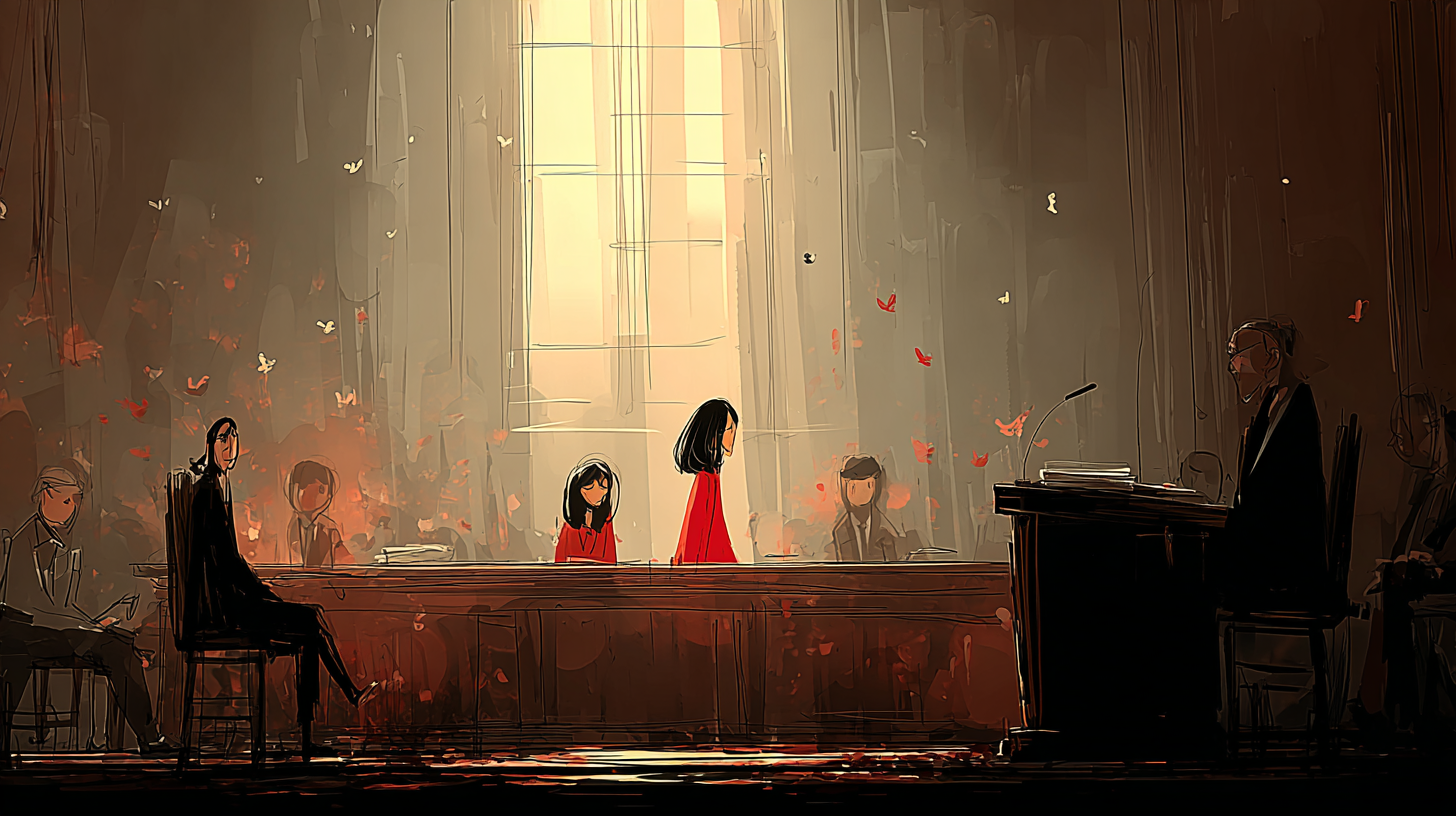A jury is a group of people who decide if someone did something wrong in court.
「jury」は、裁判で話を聞いて、その人が悪いことをしたかどうかを決める人たちのグループのことです。
以下は英単語 “jury” に関するストーリー型学習コンテンツです。まずは大枠の意味を理解して最後の文章で確認しましょう。
主な意味(main meaning)
| 品詞 | 意味 | 発音記号 | 英語例文 |
|---|---|---|---|
| 名詞 | 裁判で有罪かどうかを決める人たち(陪審員団) | /ˈdʒʊəri/ | The jury found the man guilty of the crime. |
語源(etymology)
語源:ラテン語 jurare(誓う)→ 中世英語 juré(誓った人たち)から派生
核となるイメージ:正しく判断するために誓った人たちの集まり
類義語(synonyms)
| 類義語 | 例文 |
|---|---|
| panel | The panel of experts reviewed the evidence. |
| committee | The school committee made a decision about the new rules. |
| tribunal | The tribunal judged the case fairly. |
| board | The board voted on the new policy. |
| group | A group of citizens was called to serve on the jury. |
反義語(antonyms)
| 反義語 | 例文 |
|---|---|
| defendant | The defendant listened quietly during the trial. |
| judge | The judge gave the final sentence after the jury’s decision. |
コロケーション(collocations)
| コロケーション | 例文 |
|---|---|
| jury duty | She was called for jury duty last week. |
| jury verdict | The jury verdict was announced after three days. |
| trial by jury | Everyone has the right to a trial by jury. |
| jury box | The jurors sat quietly in the jury box. |
| hung jury | The trial ended in a hung jury and had to be retried. |
2項表現(binomials)
| 2項表現 | 例文 |
|---|---|
| judge and jury | In some cases, the same person acts as both judge and jury. |
| law and order | The jury plays a key role in keeping law and order. |
英語ストーリー(english story)
Title: The Unexpected Jury Duty
Emily had just started a new job at a publishing company when she received a letter from the government. It was a summons for jury duty. At first, she felt nervous. She had never been in a courtroom before, and now she was supposed to help decide if someone was guilty or not.
The case was about a man who was accused of stealing from his workplace. Emily and eleven other people sat in the jury box, listening carefully to both sides. The judge explained the law, and the defendant said he was innocent. The panel had to look at all the evidence before making a decision.
During the trial, Emily kept thinking about what was fair. The jury discussed the case for several hours in a small room. Some jurors believed the man was guilty, but others were not sure. Finally, they reached a verdict: not guilty. There wasn’t enough clear evidence.
After the case ended, Emily felt proud. Being on a jury had helped her understand how the legal system works. She also realized how important it is to listen carefully and make decisions together. Though she was glad to return to her normal life, the experience had taught her the meaning of law and order.
和訳
タイトル:思いがけない陪審員の仕事
エミリーは出版社で新しい仕事を始めたばかりの頃、政府から手紙を受け取りました。それは**陪審員の仕事(jury duty)**への召喚状でした。最初はとても緊張しました。法廷に入ったこともなかったのに、誰かが罪を犯したかどうかを決める役割を担うことになったのです。
裁判は、ある男性が職場から物を盗んだとされる事件でした。エミリーと他の11人は**陪審席(jury box)**に座り、両方の話を注意深く聞きました。**裁判官(judge)**が法律を説明し、**被告人(defendant)**は無罪を主張しました。**審査団(panel)**は、判決を下す前にすべての証拠を確認する必要がありました。
裁判の間、エミリーは何が公正かをずっと考えていました。**陪審員団(jury)は、小さな部屋で何時間も議論しました。ある人は彼が有罪だと言い、他の人は確信が持てませんでした。最終的に、彼らは評決(verdict)**に達しました:「無罪」。明確な証拠が足りなかったのです。
裁判が終わった後、エミリーは誇りに思いました。**陪審員(jury)**として参加したことで、法制度の仕組みを理解することができたのです。また、注意深く話を聞いて協力して決定を下すことの重要さにも気づきました。いつもの生活に戻れて安心しましたが、**法と秩序(law and order)**の大切さを学ぶ経験となりました。
Q&A
- Q「jury」と「panel」の違いは?
- A
「jury」は裁判で有罪・無罪を決める一般市民の集まりです。
「panel」は専門家や審査員など、ある目的のために集められた人たちのグループで、裁判以外でも使われます。
例:テレビの討論番組に出る専門家の「パネル」など。
- Q「jury」と「committee」の違いは?
- A
「committee」は学校や会社、政治の場などで特定の仕事をするためのグループです。
「jury」は裁判に限定された役割を持つ市民グループです。
例:「校則を決める委員会」は「committee」ですが、裁判の陪審員は「jury」です。
- Q「jury」と「tribunal」の違いは?
- A
「tribunal」は特定の法的問題を扱う法廷や審査機関のことで、裁判官や専門家が判断します。
一方、「jury」は一般市民が参加して判断を下します。
例:労働問題などに使われる特別な審判機関は「tribunal」です。
- Q「jury」と「board」の違いは?
- A
「board」は組織の意思決定をするための役員グループです。学校の理事会や企業の取締役会が該当します。
「jury」はあくまで裁判に参加する市民であり、組織の運営には関わりません。
- Q「jury」と「group」の違いは?
- A
「group」は最も一般的な言葉で、「人の集まり」を広く指します。目的や役割を問わず使えます。
「jury」は特定の法的目的(有罪・無罪の判断)のために選ばれたグループです。
- Q「jury」と「jury duty」の違いは?
- A
「jury」は陪審員のことそのものを指します。
「jury duty」は「陪審員として呼ばれる義務」のことです。呼び出し状が届いた時点で始まる義務です。
- Q「jury」と「jury verdict」の違いは?
- A
「jury」は判断する人たちのこと。
「jury verdict」はその人たちが出した「評決(有罪か無罪かの結論)」です。
- Q「jury」と「trial by jury」の違いは?
- A
「jury」は陪審員団。
「trial by jury」は「陪審裁判」の意味で、「陪審員が判断を下す裁判制度」のことです。
- Q「jury」と「jury box」の違いは?
- A
「jury」は人たち、「jury box」は彼らが座る法廷内の「席・エリア」のことです。
- Q「jury」と「hung jury」の違いは?
- A
「jury」は陪審員団そのもの。
「hung jury」は「意見が分かれて結論が出せない陪審員団」のことです。この場合、裁判は無効になります。
- Q「judge and jury」とは?
- A
「judge」は裁判官、「jury」は陪審員。
「judge and jury」とは「両方の役割を1人が担う」という意味で、権限が集中している状況を指すこともあります。
- Q「law and order」と「jury」の関係は?
- A
「law and order(法律と秩序)」は社会を安定させるための基本的な仕組みです。
「jury」はその仕組みの中で、公正な判断をするために重要な役割を担います。



コメント